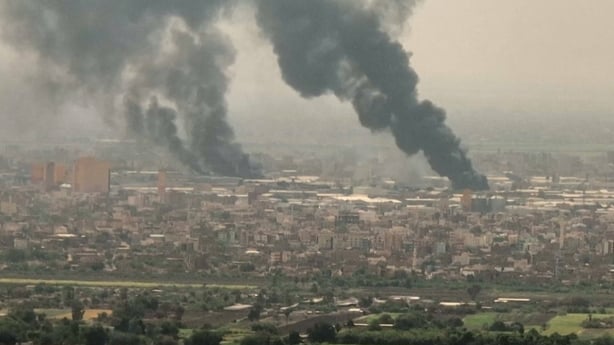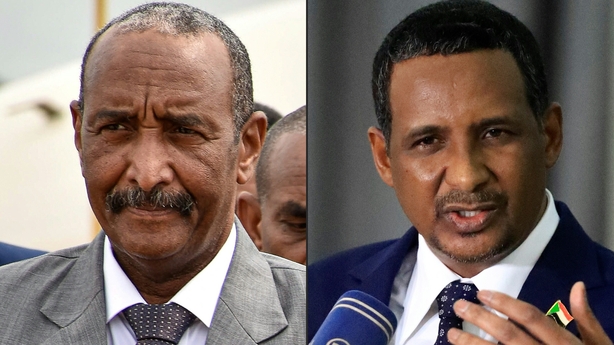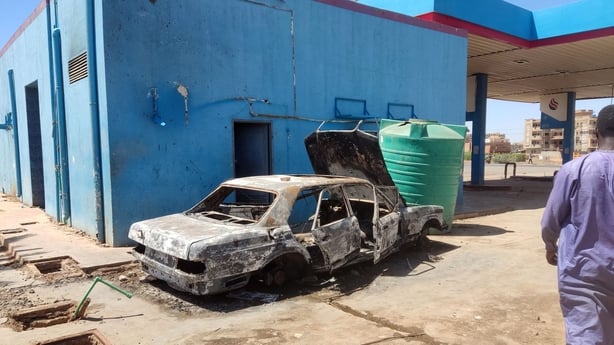Envoys from Sudan's warring military factions - the army and the paramilitary Rapid Support Forces - were in Jeddah for talks today, Saudi Arabia's foreign minister said, as international mediators pressed for an end to the three-week-old conflict.
The US-Saudi initiative is the first serious attempt to end fighting that has turned parts of the Sudanese capital Khartoum into war zones and derailed an internationally backed plan to usher in civilian rule following years of unrest and uprisings.
Saudi Arabia and the US earlier welcomed the "pre-negotiation talks" between the army and the RSF, and urged them to actively engage following numerous violated ceasefires.
Western powers, including the United States, have backed a plan for a new transition and a civilian government.
But both sides have made it clear they would only discuss a humanitarian truce, not negotiate an end to the war.
Confirming his group's attendance, RSF leader Mohamed Hamdan Dagalo, commonly known as Hemedti, said he hoped the talks would achieve their intended aim of securing safe passage for civilians.

Sudan's armed forces said they sent a delegation to the Red Sea city yesterday evening, but special envoy Dafallah Alhaj said the army would not sit down directly with any delegation that the "rebellious" RSF might send.
Hemedti has meanwhile vowed to either capture or kill army leader Abdel Fattah al-Burhan, and there was also evidence on the ground that both sides remain unwilling to make compromises to end the bloodshed.
Saudi foreign minister Faisal bin Farhan said in a tweet he hoped both sides would "engage in dialogue that we hope will lead to the end of the conflict".

In the city of Bahri, across the Nile from Khartoum, warplanes were heard overnight and explosions startled residents.
"We don't leave the house because we're scared of stray bullets," said a resident who gave his name as Ahmed.
An eyewitness in eastern Khartoum reported gun clashes and air strikes over residential areas today.
The Turkish ambassador's car also came under fire from unknown assailants, a Turkish diplomatic source said. The envoy was safe inside the embassy.
Turkey's foreign minister said Turkey would move its embassy from Khartoum to Port Sudan following the attack.
Both the RSF and army accused each other of being behind the attack.
The conflict erupted on 15 April, following the collapse of an internationally backed plan for a transition to democracy.
Burhan, a career army officer, heads a ruling council installed after the 2019 ouster of long-time autocrat Omar al-Bashir and a 2021 military coup, while Hemedti, a former miitia leader who made his name in the Darfur conflict, is his deputy.
Prior to the fighting, Hemedti had been taking steps like moving closer to a civilian coalition that indicated he had political plans. Burhan has blamed the war on his "ambitions."
Humanitarian catastrophe
Western powers have backed the transition to a civilian government in a country that sits at a strategic crossroads between Egypt, Saudi Arabia, Ethiopia and Africa's volatile Sahel region.
White House national security adviser Jake Sullivan was travelling to Saudi Arabia at the weekend for talks with Saudi leaders.
Saudi Arabia has had close ties to Burhan and Hemedti, both of whom sent troops to help the Saudi-led coalition in its war against the Houthi group in Yemen. The kingdom is also focused on security in the Red Sea, which it shares with Sudan.

The UN has significantly cut back its operations in Sudan after three of its employees were killed and its warehouses were looted, and sought guarantees of safe passage of humanitarian aid.
The fighting has also impacted vital infrastructure and caused the closure of most hospitals in conflict areas. UN agencies have warned of a humanitarian catastrophe if clashes continue.
The World Health Organisation said today it had delivered medical aid to Port Sudan, but was awaiting security and access clearances that have prevented several such shipments from reaching Khartoum, where the few hospitals that are functioning are running out of supplies.
Children at risk
The conflict has killed about 700 people so far, mostly in Khartoum and the western Darfur region, according to the Armed Conflict Location and Event Data Project.
Spokesman James Elder said UNICEF had received reports from a trusted partner, not yet independently verified by the United Nations, that 190 children were killed and 1,700 wounded during the conflict's first 11 days.
He said the figures had been gathered from health facilities in Khartoum and Darfur since 15 April, meaning that they only cover children who actually made it to facilities in those areas.
"The reality is likely to be much worse," Mr Elder said.
Aid workers have struggled to get much-needed supplies to areas hit by violence.
According to the International Medical Corps, at least 18 aid workers have been killed amid the fierce urban fighting.
The UN Human Rights Council said it would hold a special session next Thursday "to address the human rights impact of the ongoing conflict".
US Director of National Intelligence Avril Haines said Thursday that Washington expected the conflict to continue for a long time.
The fighting was "likely to be protracted as both sides believe that they can win militarily and have few incentives to come to the negotiating table," she told a Senate hearing.
Nearly 450,000 civilians have already fled their homes since the fighting began, the International Organization for Migration said, including more than 115,000 who have sought refuge in neighbouring countries.
International mediation
The United Nations Refugee Agency (UNHCR), said it was preparing for an outflow of 860,000 people, adding that $445 million (€403 million) would be needed to support them just through October.
Ms Haines said the conflict had exacerbated already dire humanitarian conditions, "raising the spectre of massive refugee flows and aid needs in the region".
The UN warned that if the fighting continued, it could raise the already large number of Sudanese threatened by hunger and malnutrition by as many as 2.5 million.
"That raises the number to a total of 19 million people in the next three to six months," said Farhan Haq, a spokesman for UN chief Antonio Guterres.
Mediation efforts have multiplied since the conflict began.
Speaking from the Ethiopian capital, Mr Burhan's envoy Dafaallah al-Haj vowed that "shortly the government of Sudan is going to put an end to this rebellion," referring to the RSF.
The RSF is descended from the Janjaweed, a militia unleashed by Bashir in Darfur, leading to war crimes charges against the former leader and others.
After a joint coup in October 2021 that upended a fragile transition to civilian rule, Mr Burhan and Mr Daglo have engaged in a power struggle, most recently over the RSF's integration into the regular army, which has now flared into bloody violence.
